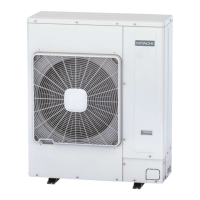8 Troubleshooting
203
SMGB0064 rev.0 - 08/2011
8
Phenomenon Cause Check item
Action
(Turn OFF the main switch)
Cooling or heating proc-
ess with an abnormal
sound
Foreign particles inside of the fan casing Visually inspect it Remove the foreign particles
Indoor unit fan runner is hitting the casing Visually inspect it
Adjust the position of the fan
runner
Outdoor unit propeller fan is hitting the shroud Visually inspect it
Adjust the position of the
propeller fan
Abnormal sound from
the compressor
Faulty Installation
Check that each part is tightly
xed
Tightly x each part
Liquid ref. compression
Adjust the suction gas temp.
and pressure
Ensure superheat
Wear or breakage of
the internal comp.
parts
Abnormal Sound from the
Inside of the Compressor
Replace the compressor
No heating by the oil
heater
Check the Resistance (Oil
Heater, Fuse)
Replace the oil heater or the
fuse
Humming sound from the magnetic conductor
Check the surface of the
contacts
Replace the magnetic switch
Abnormal vibration of the cabinets Check each xing screw Tightly x each screw
Outdoor fan does not
operate when the com-
pressor operates
Obstacle at the outdoor fan Check the obstacles Remove the obstacles
Watching condition for the heating process
Wait for the switching of the
4-Way Valve (1 ~ 3 minutes)
If the 4-Way Valve does not
switch, check for insufcient
refrigerant
Indoor fan does not
operate when the com-
pressor operates
Discharge pressure does not increase higher than
1.5 Mpa due to the insufcient refrigerant
Check the operation pressure
*5)
Add the refrigerant
Disconnected Wiring for the Indoor Fan Check the wiring Connect the wiring correctly
N O T E
• *1): Refer to section Self-checking of the remote control switch, see on page 301
• *2): Refer to section Self-checking procedure of PCB by means of the Remote Control Switch, see on page 299.
• *3): Even if the remote control switches are normal, the compressor does not operate under the following
conditions:
1. Indoor temp. is lower than 21 °C or outdoor temp. Is lower than -5 °C during the cooling process (DB).
2. Indoor temp. is higher than 27 °C (DB) or outdoor temp. is higher than 15 °C (WB) during the heating
process.
3. When a cooling (or heating) process signal is given to the outdoor unit and a different mode as heating (or
cooling) process signal is given to the indoor units.
4. When an emergency stop signal is given to outdoor unit.
• *4): Refer to chapter 7 of “Technical Catalogue”.
• *5): Refer to chapter 10 of “Technical Catalogue”.

